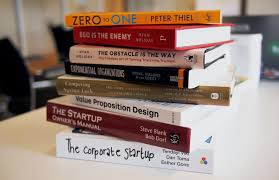
Founder: Dr. Malpani, you’ve funded so many startups and seen founders succeed—and fail. I have a question many founders like me often wonder about. If you had to recommend just one book that every entrepreneur must read, what would it be?
Dr. Malpani: That’s a great question, but honestly, my answer is: it depends.
Founder: Depends? On what?
Dr. Malpani: On a lot of things! What books have you already read? What kind of books do you enjoy? Most importantly, what specific problem are you trying to solve by reading this book?
You see, a book is just a tool—a powerful one, yes, but its value lies in how relevant it is to your current challenges as a founder. This is why I’m always reluctant to give a blanket recommendation. A book that transformed my thinking might not resonate with you at all if you’re not in the right frame of mind or dealing with a similar problem.
Founder: That makes sense. But surely there are some “must-reads” for entrepreneurs?
Dr. Malpani: The truth is, my list of favorite books changes all the time! It evolves based on my experiences, the phase of life I’m in, and the new books I’ve encountered. That said, I can give you a framework to help you discover the right books for you.
Founder: A framework? Please go on.
Dr. Malpani: First, start with the basics. Think about the challenges you’re facing in your startup right now. Are you struggling with sales? Then read a book on selling or persuasion. Trying to build a great team? Pick up something on leadership or culture. The key is to address a real problem you’re experiencing.
Second, once you find a book you like, dive deeper. Explore other books by the same author or check out the bibliography at the end. Often, authors list their own influences, and these can lead you to a goldmine of insights.
And third, don’t just read passively. Read actively.
Founder: What do you mean by actively?
Dr. Malpani: Reading isn’t about finishing pages; it’s about learning and applying. Take notes. Highlight sections that resonate with you. And here’s a tip: share what you learn publicly. Whether it’s through blogs, LinkedIn posts, or discussions with peers, teaching others helps you solidify your understanding.
But the most critical step? Apply what you read. Reading a hundred books won’t help if you don’t implement the ideas in your business or life.
Founder: That’s a good point. But doesn’t reading take time? As a founder, I feel like I’m always juggling ten things at once.
Dr. Malpani: I get it. But here’s the thing—reading isn’t a luxury for a founder; it’s an investment. The right book, read at the right time, can save you from making expensive mistakes or open your eyes to opportunities you hadn’t considered. Think of it as a high-leverage activity.
But remember, books aren’t the only source of knowledge. Your customers are one of the best “books” you can read.
Founder: Customers?
Dr. Malpani: Absolutely. When you’re bootstrapping, you don’t have the luxury of burning cash on experiments that don’t work. That’s why I always encourage founders to put their customers first. Talk to them. Understand their pain points deeply. Then, focus on solving real problems for them, not the ones you imagine they have.
Founder: That’s a lesson I’m learning the hard way. Sometimes, we spend so much time perfecting the product that we forget to check if customers even want it!
Dr. Malpani: Exactly. Bootstrapping forces you to stay grounded. It teaches you frugality, focus, and discipline—qualities that are invaluable for building a sustainable, scalable business.
Founder: But don’t you think raising funds early can help us scale faster?
Dr. Malpani: It can—but only if you’ve built a strong foundation first. Too often, founders chase funding before they’ve validated their product or achieved product-market fit. They end up building a business to impress investors instead of solving customer problems.
I’m not against raising funds, but I believe it should be done for the right reasons and at the right time. Bootstrapping keeps you accountable. It ensures your growth is tied to delivering value to your customers, not to spending investor money.
Founder: That’s a refreshing perspective. So, to sum it up, focus on solving real customer problems, bootstrap to stay disciplined, and read actively to keep learning.
Dr. Malpani: Exactly! Entrepreneurship isn’t about ticking boxes or following formulas. It’s about constant learning, adapting, and staying true to your mission. Books, like bootstrapping, are just tools to help you along the way.
So, instead of asking which book to read, ask yourself: What’s the most pressing question I need an answer to? And then find the book—or customer—that holds the answer.
Founder: Thank you, Dr. Malpani. This conversation has been eye-opening.
Dr. Malpani: You’re welcome. Remember, the best entrepreneurs are always learning—whether it’s from books, customers, or their own mistakes. Keep going, and don’t forget to enjoy the journey!
Want to learn more about bootstrapping and creating sustainable businesses? Explore more insights and resources for entrepreneurs at www.malpaniventures.com . Let’s build businesses that put customers first!